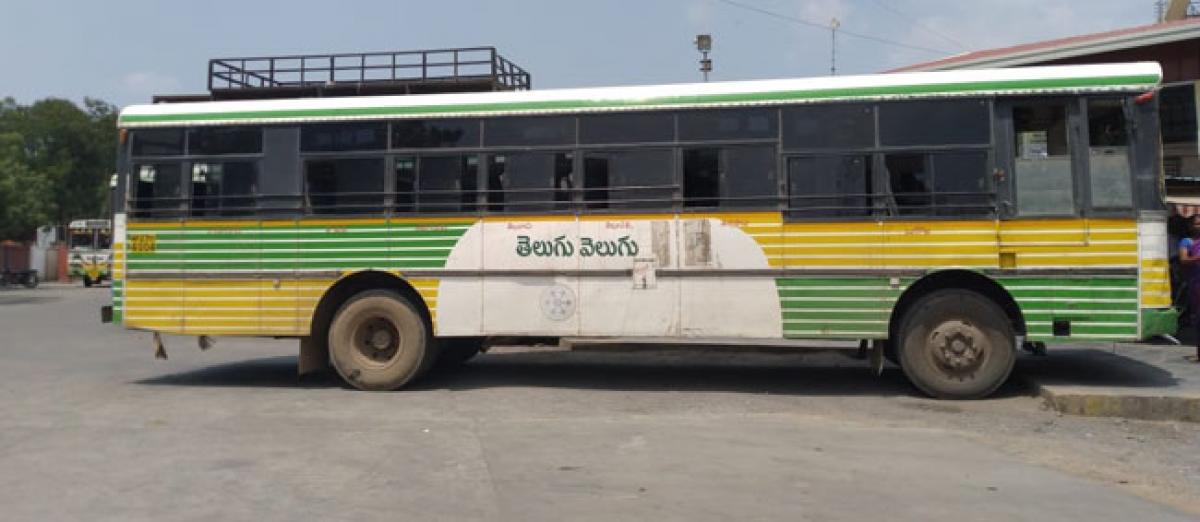Live
- Police clarify on Sandhya Theatre mgmt’s letter, deny allegations of misbehaving with Allu Arjun
- Ecotourism offers career opportunities
- PVKK IT Diploma College celebrates Freshers’ Day
- Politicos RISE to defend ‘Pushpa’
- Bhumi puja performed for Adani Junior College building
- Did Allu Arjun fight for India at border, asks CM Revanth
- CM Revanth, officials to inspect residential, Gurukul hostels today
- SSBs to be set up soon in Nellore
- TGPSC all set for holding Group-II exams
- Commissioner directs officials to ensure safe water supply amid heavy rains
Just In

Among 8,270 buses plying on the road, nearly 1,500 buses have completed more than 13 lakh kms of running and should have scrapped long ago
Ongole: Among 8,270 buses plying on the road, nearly 1,500 buses have completed more than 13 lakh kms of running and should have scrapped long ago.
But these buses are carrying passengers to and fro villages as Telugu Velugu services or running overcrowded in heavy traffic as city buses. The RTC management has failed to maintain these buses properly especially the tyres and other ancillary parts.
According to statistics released by the APSRTC, 10,939 buses including 2,669 hired buses in the fleet cover 43.41 lakh kms daily in the state connecting 14,123 villages. As a policy, when the super luxury, express buses complete 13 lakh kms of service, the APSRTC convert them into Telugu Velugu and city buses instead of purchasing new buses.
In the APSRTC fleet, there are 4,493 super luxury, express, ultra-deluxe and ghat road buses while 5,659 buses are Telugu Velugu and 753 buses are ordinary city buses.
As per the vehicle scrapping policy of Government of India, the commercial vehicles that have completed 20 years of life or 15 lakh kms of service should be scrapped, but nearly 1,500 buses in Telugu Velugu and city buses are carelessly running on roads despite several breakdowns being reported by the staff.
Apart from the continuing these buses in the fleet, the APSRTC officials issued maintenance guidelines in Circular No 3 recently. According to them, the mechanics in garage need not check oil filters, brake shoes or put grease to the parts.
The maintenance of vehicles that require service and change of engine oil at every 12,000 kms as per the Schedule 3 is postponed to 24,000 kms and those vehicles that should be services after 17,000 kms as per the Schedule 4 are asked to do it after 35,000 kms.
APSRTC Employees Union president YV Rao said these guidelines are increasing the risk to lives of passengers apart from burden on spare parts. He said the corporation, which cannot buy new vehicles, is running those 1,500 buses that should be scrapped to meet the demand.
He alleged that the officials, who don’t have ground level experience, are reducing the staff number and number of maintenances to reduce the financial burden. Instead, he suggested strengthening the workshops, replacing the old vehicles with new ones to drive the organisation into profits.
When asked what makes the RTC to use the to-be-scrapped buses as Telugu Velugu buses, Rao said, “It is the need of poor and village people to use these buses to come to the town. They do not complain of comfort.”
The APSRTC claimed that there are 0.04 breakdowns per 10,000 kms and 0.08 accidents per one lakh kms on average. That is, on average there are 6,338 breakdowns and 1,267 accidents every year.
G Vijaya Geetha, the new regional manager for Prakasam, said there are no to-be-scrapped buses in her region. She said the corporation might be using such buses in less traffic routes. But she said there were 38 deaths in 68 accidents occurred in 2016-17, another 38 deaths in 85 accidents in 2017-18 and 12 deaths in 27 accidents in 2018-19 till now.

© 2024 Hyderabad Media House Limited/The Hans India. All rights reserved. Powered by hocalwire.com







